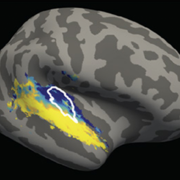Study reveals brain regions that respond differently to the presence of background noise, suggesting the brain progressively hones in on and isolates sounds.
by Sabbi Lall | McGovern Institute for Brain Research
In a busy coffee shop, our eardrums are inundated with sound waves — people chatting, the clatter of cups, music playing — yet our brains somehow manage to untangle relevant sounds, like a barista announcing that our “coffee is ready,” from insignificant noise. A new McGovern Institute for Brain Research study sheds light on how the brain accomplishes the task of extracting meaningful sounds from background noise — findings that could one day help to build artificial hearing systems and aid development of targeted hearing prosthetics.
“These findings reveal a neural correlate of our ability to listen in noise, and at the same time demonstrate functional differentiation between different stages of auditory processing in the cortex,” explains Josh McDermott, an associate professor of brain and cognitive sciences at MIT, a member of the McGovern Institute and the Center for Brains, Minds and Machines, and the senior author of the study.
The auditory cortex, a part of the brain that responds to sound, has long been known to have distinct anatomical subregions, but the role these areas play in auditory processing has remained a mystery. In their study published in Nature Communications, McDermott and former graduate student Alex Kell discovered that these subregions respond differently to the presence of background noise, suggesting that auditory processing occurs in steps that progressively hone in on and isolate a sound of interest...
Read the full story on MIT News using the link below.

